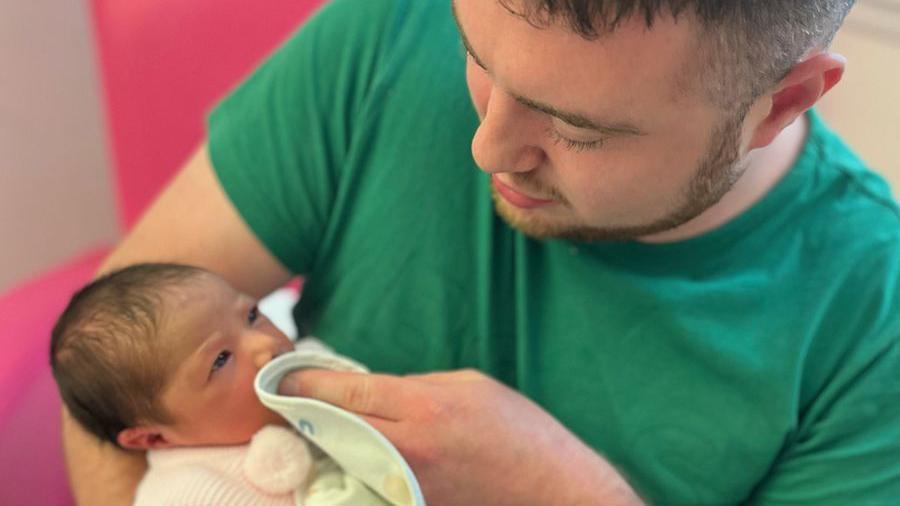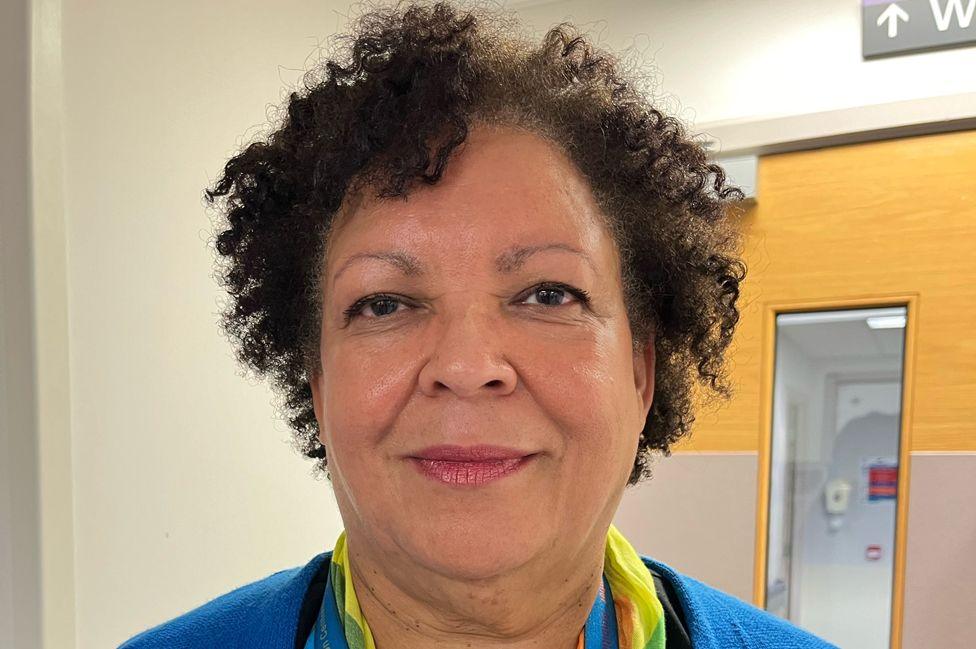Regular inspections to be introduced at maternity wards

Baby Gia was born at Forth Valley Royal Hospital last week
- Published
Maternity units in Scotland will undergo unannounced inspections from the start of next year, it has been announced.
The move was recommended by experts after a number of spikes in the deaths of newborn babies in Scotland in recent years.
Routine inspections by Healthcare Improvement Scotland will begin in January, with the first report being published in April.
Families will be able to review the reports about the maternity wards which they are due to attend.
Maternity units in England are inspected by the Care Quality Commission, which last year found that two thirds were not safe enough.
There have not been routine inspections of maternity units in Scotland until now, although they have been included in wider hospital inspections or been subject to specific assessments.
Improvements needed in baby death investigations
- Published27 February 2024
Most maternity units not safe enough - regulator
- Published16 November 2023
Maternity services to be 'transformed'
- Published14 February 2019
The introduction of routine, unannounced inspections in Scotland was one of the key recommendations of an independent review published in February.
It was carried out by retired consultant neonatologist Dr Helen Mactier, and looked at two spikes in the deaths of newborn babies over a six-month period in 2021/22.
The review estimated there had been 30 additional deaths of babies within 28 days of birth in 2021/22, compared to the previous four years.
It concluded that most of these deaths could be explained by an increase in the number of preterm births or babies born with congenital conditions.
However, it also said there were significant gaps in understanding and variation in how deaths are investigated.
Last year, there were 122 deaths of babies who were under four weeks old in Scotland. The rate of neonatal deaths rose to 2.7 in every 1,000 births - the joint second highest rate since 2009.

Ryan and Kirsty with their son Adam and new baby Gia
The number of complex births is increasing in Scotland because of mothers being older, obese or having diabetes.
There is an upward trend of women having children later in life. The latest data from Public Health Scotland showed that a quarter of women having babies were aged 35 or older, external.
It said that more that 25% of pregnant women were affected by obesity, while almost 10% had diabetes – and both rates are on the increase.
Public Health Scotland says women living in more deprived areas are likely to be overweight or obese, have diabetes, to give birth prematurely and for babies to be smaller than those from less deprived areas.
Ethnicity also impacts outcomes. Some ethnic minority groups were more likely than white women to have a preterm birth.
In response to Dr Mactier’s review, NHS safety watchdog Healthcare Improvement Scotland said it would begin inspections across all of the country’s 18 obstetric units from January 2025. The aim is to do about 10 inspections a year.

Ann Gow is the director of nursing and system improvement at Healthcare Improvement Scotland
These inspections will take place over two days, looking at the care provided and speaking to parents and staff. There will be checks on whether staff have the correct training and patient health records will be reviewed.
Ann Gow, director of nursing and system improvement at Healthcare Improvement Scotland, said: “We are concerned we may find some things that aren’t right.
“But we’d much rather find them and address them, and that people know that we are looking into them, than to leave them altogether.”
Ms Gow believes the inspection reports will give parents confidence in the maternity services.
Professional standards will also be produced which will be shared to staff across Scotland to help improve care and outcomes.
The introduction of the inspections was welcomed by Kirsty Forsyth and Ryan O’Connor, whose second child Gia was born by caesarean at Forth Valley Royal Hospital last week.
Ryan said: “To be coming into a safe environment puts your mind at ease.
“Not everything goes to plan but anything that’s cropped up, they’ve been with us all the way through it.”

Gillian Morton, director of midwifery at NHS Forth Valley, said safety was paramount
Gillian Morton, NHS Forth Valley’s director of midwifery, also welcomed the inspections and said safety was paramount.
“I guess the real challenge in maternity services is the fact that it’s unpredictable. We never know when women will go into labour, for example, so it is important that we have the right staff at the right time,” she said.
“I think it’s important for women and their families to understand that the vast majority of births in Scotland are safe and people have a good experience.
“Behind the scenes everybody is working together on making sure things are safer for families, and we do the learning when things go wrong.”
The Royal College of Midwives said the inspections would highlight challenges faced by staff.
“There is no point in any inspections, standards or safe staffing legislation if we continue to be crippled by workforce challenges," it said.
"Understaffing undoubtedly compromises safety and currently we have far too many services without the right levels of midwifery staff and correct skill mix.”
If you're affected by the issues in this report, you can find support from BBC Action Line